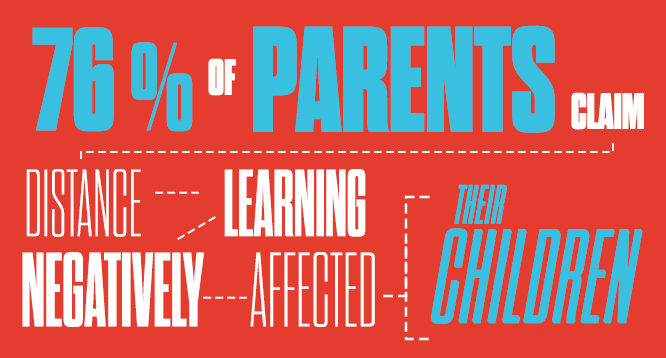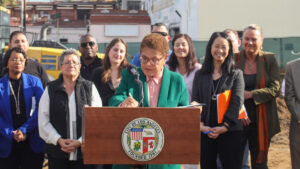The Challenge
Since the release of last Fall’s “No Going Back LA” report, we continue to witness the pandemic’s devastating toll on vulnerable Angelenos from the elderly and the economically infirmed, to Indigenous populations and communities of color. In particular, COVID-19 has dealt a considerable blow to education systems across Los Angeles, leaving children and their families to fall behind with few options and grim prospects for the future.
Indeed, LA schools serve as critical social institutions where students and their families can receive an education not only in academics, but in areas such as healthcare, proper nutrition, counseling, support, and safety. Beyond the pandemic’s severing impact on these essential resource channels, children have also suffered dramatic and often traumatic disruptions to their daily lives: daycare interrupted, primary and secondary schools closed, social lives effectively on pause.
To be sure, the heightened social disconnect during the pandemic will have devastating long-term psychological implications for LA students, with similarly adverse effects seen in terms of educational growth: Los Angeles Unified School District students have experienced significant learning loss during the pandemic, the consequences of which will almost certainly affect educational outcomes far beyond the end of school closures and pandemic restrictions. Already, two in three LAUSD students are falling behind in literacy and math.

- 40% of LAUSD middle and high schoolers were disengaged from March 2020 classes
- 40,000 LAUSD high schoolers are at-risk of not graduating in the next four years
The leading factors for learning loss—lack of reliable internet access, health challenges, lack of appropriate spaces for learning, and economic impacts on their households—all disproportionately affect students from vulnerable, low-income, or marginalized communities. In a survey conducted by AltaMed in South East LA in Jan 2021, more than 65% of respondents had experienced changes in income due to the pandemic, with additional families affected by job losses, COVID-19 related deaths, and hospitalizations. Of these families, 1 in 3 reported that their children’s grades dropped during the pandemic. For families that had not suffered these covid-related impacts, 1 in 6 reported their children’s grades dropping. Even before COVID-19, disparities in educational outcomes often existed along stark racial and income lines. Without urgent changes, our education system will seed decades more of inequality among Angelenos.
“I tell students that their story is their strength…They are survivors and if they learn how to ask for help and can overcome growing up experiencing housing and food insecurity, poverty, violence, and no healthcare — the basic things most people take for granted — then there is nothing that can hold them back.”
Debra Duardo, Los Angeles County Superintendent of Schools
The Way Forward
We must push for fundamental changes to our education system. During the remainder of the pandemic, we must support students, families, and school staff during remote teaching and instruction. Just as importantly, we must support equity-based funding policies for schools to ensure that historical inequalities are addressed and ultimately eliminated. Finally, we must look to engage both students and parents in decision-making about local programs, to ensure they are aligned with the community’s needs.
There have fortunately been promising education policy initiatives rolled out in response to the pandemic’s impact on education. The LA City Budget includes, for instance, $5 million in Angeleno Corps Stipends for 400 students to engage in community-focused service, including tutoring, mentorship, and closing the digital divide. Community organizations are also seeking to remove barriers for underserved residents — Brotherhood Crusade, for instance, works to provide equitable access to resources in South LA, including culturally competent support and youth programs. Finally, recognizing the need for further equity in schooling, California’s two-year transitional Kindergarten program will be expanded to include all 4-year-olds for free by 2025 and will include pre-school meals for all students. To compensate for the high cost of living, the state is equally implementing a free lunch program for all its students beginning in Fall 2021.
Students have shown tremendous resilience, empathy and adaptability during this pandemic, as have their families and schools. Teachers and other school workers have similarly responded in the most trying circumstances. Yet more must be done to drive transformational change in education. Beyond working to alleviate the immediate effects of living in low-income, unstable environments, more attention must be paid to our woefully underfunded and racially segregated school system. Many students still lack access to even the most basic resources, and many more are missing out on the mentorship and support that is integral to their success. By failing to systematically address these grave, structural issues, we are denying our children the very foundation of their futures.



